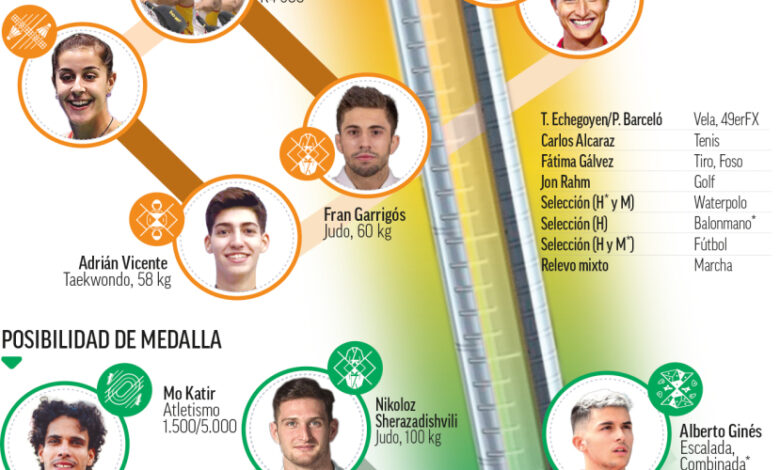Spain’s thermometer in Paris 2024: sure, probable medals, surprises…

The Spanish Olympic sport, an irrelevant secondary actor during its first century, took its first great leap in the 1992 Barcelona Games. In the warmth of its public and after a significant investment from the public and private sectors -via the ADO Plan-, Spanish athletes were able to win 22 medals, 13 of them gold, to climb to sixth place in the medal table.
The immediate challenge was to maintain this new status with a similar number of medals in Atlanta 1996, Sydney 2000 and Athens 2004, something that was achieved without too much trouble beyond the poor figures – barely 11 medals – of the oceanic event. Once the project is established, We had to continue growing to be on par with the large countries around us -France, Italy, Germany…- but that second competitive leap has been much more complicated.
To the point that we still haven’t surpassed those 22 medals from Barcelona’92. This ‘glass ceiling’ has become an obsession that appears again on the horizon of the Paris Games, in which Spanish sport should perform in the figures of the last Olympic events. In other words: we still haven’t taken that second leap. Because?
Spain’s medal options at the Paris Games.
First of all, because we do not have a defined project. With the ADO Plan exhausted, Spanish Olympic sport is a kingdom of taifas in which each federation is self-managed. That is to say, there is no ‘supra federative’ entity that provides a global vision of our Olympic sport – the Higher Sports Council (CSD) has never assumed that role -, as It does happen in other countries such as the Netherlands, Australia, Canada, New Zealand or Ireland..
It is true that andhe current Government has made a significant effort and has increased the money allocated to high-performance sportsespecially with the creation of the promising Team Spain Elite programbut our country continues to lack a strategy and, above all, defined short, medium and long-term objectives.
have fishing grounds
And secondly, and no less important, because our Olympic sport is still enormously choral, which is very good, but it lacks ‘fishing grounds’ reliable and durable medals beyond canoeing or sailing.
This can be seen perfectly if we compare our record in the Games with that of a country like Hungary, which perhaps never had a Ballesteros, a Santana, an Alonso, a Gasol or a Nadal but that almost quadruples our 48 golds in the summer editions – it has 181 -.
Spain has won medals in up to 30 different sports but only in sailing it has more than five gold medals – 13 in total – and in just eight disciplines it has more than one gold metal. Hungary, on the other hand, has only won medals in 19 sports but has accumulated 38 golds in fencing, 29 in swimming, 28 in canoeing and 20 in wrestling. and surpasses the barrier of seven Olympic titles in ten disciplines.
The challenge of a team gold 28 years later
Spain is a power in team sports and usually qualifies several in each edition of the Games, but in reality it has not won a collective gold since water polo in Atlanta 1996. Right now only the men’s soccer team and the women’s water polo team are classified but we aspire to have up to eleven teams (football, basketball, handball, water polo and field hockey in duplicate and men’s rugby 7) and several of them will arrive with great aspirations at the French event.
In Rio 2016, without going any further, Magyar athletes only won medals in four sports but reached eight gold medals. It’s more, 30 Hungarian athletes have won three or more Olympic golds for no Spaniard…
The panorama, with regard to Spanish aspirations in Paris 2024, is identical to that of the last editions, with canoeing as the figurehead and a significant number of podiums on the eaves that will make the final result more or less satisfactory .
If the ‘glass ceiling’ of Barcelona’s 22 medals is broken, there will be smiles and talk of growth but If we stay between 15 and 20 metals again, as has happened since Athens 2004, no one will ask for explanations because, in reality, no one really knows what we aspire to in the Olympic Games…




